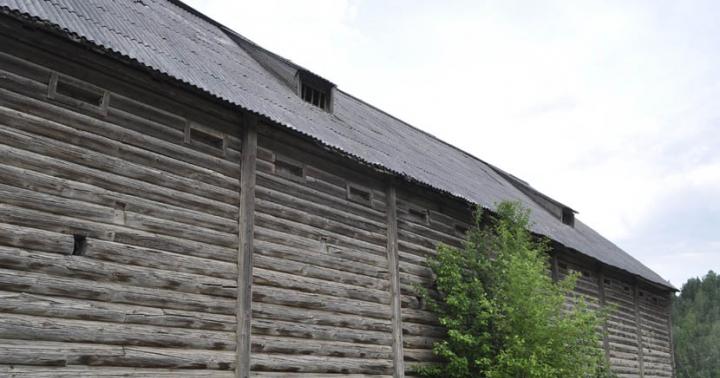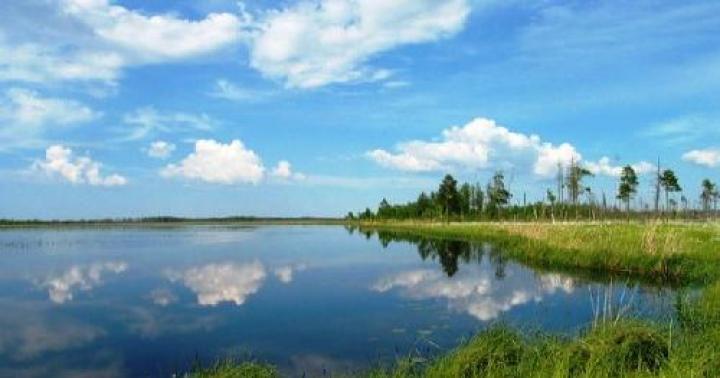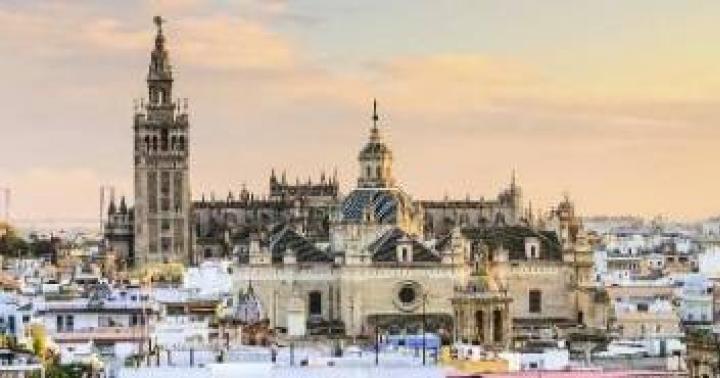A lake is a closed depression of land filled with water and not having a direct connection with the ocean. Unlike lakes, they are reservoirs of slow water exchange. The total area of the Earth's lakes is about 2.7 million km2, or about 1.8% of the land surface. Lakes are distributed everywhere, but unevenly. The geographical distribution of lakes is greatly influenced by climate, which determines their nutrition and evaporation, as well as factors contributing to the formation of lake basins. There are many lakes in the regions; they are deep, fresh and mostly flowing. In areas with a dry climate, all other things being equal, there are fewer lakes, they are often low-water, often drainless, and therefore often salty. Thus, the distribution of lakes and their features are determined by geography.
4. Karst lakes, the basins of which arose as a result of failures, soil subsidence and erosion (limestones, gypsum, dolomites). The dissolution of these rocks by water leads to the formation of deep but small lake basins.
5. Dammed (dammed, or dam) lakes arise as a result of blocking the river bed (valley) with blocks of rock during landslides in the mountains (Sevan, Tana, many lakes of the Alps, and other mountain lakes). From a large mountain collapse in 1911, Lake Sarez with a depth of 505 m was formed.
A number of lakes are formed for other reasons:
- estuary lakes are common on the shores of the seas - these are coastal areas of the sea, separated from it by means of coastal spits;
- oxbow lakes are lakes that arose in old river beds.
Based on the origin of the water mass, lakes are of two types.
1. Fresh lakes - the salinity of which does not exceed 1‰ (one ppm).
2. Brackish - the salinity of such lakes is up to 24‰.
3. Salty - with a content of dissolved substances in the range of 24.7-47‰.
4. Mineral (47‰). These lakes are soda, sulfate, and chloride. In mineral lakes, salts can precipitate. For example, self-settling lakes Elton and Baskunchak, where salt is mined.
Usually wastewater lakes are fresh, since the water in them is constantly renewed. Endorheic lakes are often salty, because their water flow is dominated by evaporation, and all minerals remain in the reservoir.
Lakes, like rivers, are the most important natural resources; used by humans for navigation, water supply, fishing, obtaining mineral salts and chemical elements. In some places, small lakes are often artificially created by humans. Then they are also called .
Municipal educational institution Gilbirinskaya secondary school
COMPOSITION
Completed by: Afanasyeva Dari, 8th grade student
Kokorino village, 2012
Motherland, fontanelle, Russia, dewdrop, blue... Words associated with pure light, hope, faith and love, with the place where I was born and live.
There are many places in the world where I have visited - this is Lake Baikal, Tunka with its forests and ridges, the cities of Novosibirsk and Krasnoyarsk, where the Yenisei River flows. Beautiful forests, high mountains, as well as endless fields and magnificent cities, you can find all this on our land.
And I live in Buryatia! This is the deepest lake in the world, Baikal, the high Sayan Mountains, a wealth of forests, fur-bearing animals and plain meadows with magnificent flowers. But still, the best place, which is located near the village of Kokorino in the Ivolginsky district, is the forest lake Karasinoye. This is where you can relax, sunbathe, and swim. From the beach, there is a path around the lake that will take you to the health camps “Cheryomushki” and “Tuyaa”. And fishing here is a pleasure. This is what the boys vacationing here do. On the sandy shore you can enjoy the picturesqueness of the lake. I sit on the shore of the lake, admiring the landscape, nature is always beautiful, it makes me happy in life, I am always ready to love it and enjoy it every day. I was even attracted to this lake; I was drawn by the silence of nature and I could only hear the birds chirping or the leaves rustling.
The lake, like a magic mirror, hides a lot of mysteries. Old-timers tell legends about our lake and its surroundings. In summer you can paint excellent landscapes near the lake. You look at the lake, the world around you, feel the light breeze of the wind, the pleasant rays of the sun.
It is especially beautiful on the lake on a summer evening when the sun sets. The sun slowly sets and bright colors spread across the sky. And the stars slowly begin to light up. A fog appears near the lake, it slowly covers everything around. It becomes cooler, the birds fall silent, the soft smell of wormwood and steppe herbs begins to taste bitter in the throat. It immediately becomes quiet, peace and tranquility reigns around. I like the evening on the lake when I relax here with my parents. We light a fire, talk, sing songs and just remain silent.
Have you ever watched the sunrise on Lake Karasin? Fog appears over the lake and rises into the sky in ragged clouds. The surface of the lake becomes transparent and silvery. The first rays of the sun appear in the sky. Reeds, flowers, reaching for the warm rays of the sun, trying to survive, grow, strengthen themselves. And as a celebration of all living things, the birds begin to sing. Simply beautiful! I want to sing and enjoy life! This is what it is, our lake Karasinoye!
This summer August turned out to be hot and muggy. On the day off, mom suggested that dad and I go to the lake for a swim. We really liked the offer. We quickly collected everything we needed and hit the road.
It took us a long time to get there, because the distance from our village to the lake is long.
It was hot, the windows in the car were open all the time. I looked out the window the whole way, and I didn’t get bored at all.
I looked at the yellowing fields and green meadows, at the river with lonely fishermen in the reeds, at the blue sky with white clouds that seemed to float after the car, not lagging behind or overtaking it.
The road wound through corn fields, sometimes surrounded by walnut groves. Several times our path passed through villages and small towns. The streets were quiet and somehow strangely thoughtful. Someone else's life flashed past, very interesting, bright, and sometimes
and mysterious. I watched, with bated breath, someone else’s life, revealed for a second in fleeting pictures, as if in film frames: a girl came out and started playing with a ball. Before you have time to think about who she is, what she thinks and dreams about, a new picture opens: a woman takes off her underwear from a line stretched next to the porch of the house. Here
There’s a truck standing at a railroad crossing, and the driver is saying something to the old railroad worker, waving his arms, and it’s unclear whether they’re swearing or laughing.
It is interesting to observe the diversity of life from the car window.
Here is the lake! It looked like the sea, only a narrow strip of the opposite shore was visible. Low waves splashed lazily at our feet. I wanted to stroke their cool “back.” I bent down to dip my hand into the depths, slipped and... Plop!
It’s good that it wasn’t deep, because I’m not swimming well yet.
Then there was everything: swimming in clean water, barbecue, baked potatoes in the coals. And also the evening sky with huge stars.
Late in the evening, when it was already dark, we left for home, but there were many impressions left for a long time. Just enough until next summer!
Music for happiness - gentle guitar
The first chord is light, a breath of wind, your fingers barely touch the strings. A vanishingly quiet sound, E minor, simpler and there is nothing...
The first snowflake is light, translucent, carried by an almost imperceptible wind. She is the harbinger of snowfall, a scout who was the first to descend to the ground...
The second chord – the fingers of the left hand are deftly rearranged, the right one confidently and softly leads along the strings. Down, down, up - simple and gives the simplest sound. It's not a blizzard or a storm - just snowfall. There can be nothing complicated about it. Snowflakes begin to fly more often - the vanguard of the main forces, sparkling ice stars.
Then the chords replace each other more viscously and tenderly, so that the ear almost does not notice the transition from one sound to another. A transition that always sounds harsh. Instead of a fight, it’s too much. Eight. The intro is played and even if it’s not an instrumental that sounds triumphant and joyful during a summer downpour or viscous and bewitching in a snowstorm, even if it’s just chords put together, the music surprisingly suits the snow outside the window, the white butterflies of winter, the icy tiny stars that are all dancing, dancing their dance in the night sky...
Singing is woven into the music - quiet, the words are indistinguishable, elude perception, mixed with the snowfall and the measured, natural beating of the heart. A clear rhythm and calm strength resound in them. The song has no end, it just softly intertwines with the dance of snowflakes and goes away imperceptibly, leaving the sky and snow alone...
Cold and darkness conceal sounds and movements, reconciling the city with winter...
And the Lord of Snowfall, having played his part on one of the roofs, gently puts his guitar, which has power over the elements, into its case. There is snow on his shoulders and hair, red cheerful sparks flash and go out - snowflakes reflect the light of distant lights. There is light in the windows of the house opposite. There are people there who don’t know how to weave the lace of the elements...
The staircase is an ordinary staircase of a nine-story building. Doors, an elevator always occupied by someone, the dim light of a light bulb on the landing... The Lord of Snowfall walks, holding his guitar, quietly and slowly walking up the steps. From the ninth floor to the first, carefully so as not to disturb the warm feeling of relaxed, trusting happiness that comes every time after completing the game...
And the usual angry question from the mother who opened the door:
– When will you stop playing your games and finally start thinking?
It hits the open soul like a knife. The soft snow wings given by the fulfillment of the present break and only misunderstanding and resentment remain.
Why does she hit where it hurts the most? For what?..
At night, a wild wind mixed with snow blew through the city. Broke tree branches, tore wires, swept roads...
It was the Lord of Snowfall's guitar singing again.
The uniqueness of natural lakes lies in a number of their special characteristics. They are characterized by slow water exchange, free thermal conditions, a unique chemical composition, and differences in water levels.
In addition, they create their own microclimate and cause changes in the surrounding landscape. They accumulate mineral and organic substances, some of which are valuable and useful.
Geographical object "lake" (meaning)

There are about 5,000,000 lakes in our world. Lakes on the globe occupy almost 2% of the surface, which is almost 2.6 million km 3 . As a component of the hydrosphere, classic natural lakes are bodies of natural origin, which are lake bowls of water that do not have direct contact (contact) with the sea or ocean. There is a whole science that studies them - limnology. However, there are also anthropogenic lakes that arose as a result of human activity.
If we consider a lake as a geographical object, then its definition becomes clearer: it is a hole on land with closed edges into which flowing water falls and, as a result, accumulates there.
Characteristics of lakes

To give an accurate description of a particular lake, you need to determine its origin, position (above or underground), type of water balance (wastewater or not), mineralization parameters (fresh or not), its chemical composition, etc.
In addition, the following parameters need to be accurately determined: the total area of the water surface, the total length of the shoreline, the maximum distance between opposite shores, the average width of the lake (calculated by dividing the area by the previous indicator), the volume of water that fills it, its average and maximum depth .
Types of lakes by origin

The generally accepted classification of lakes by origin factor is as follows:
- Anthropogenic (artificial) - created by man;
- Natural - arose naturally (exogenous or endogenous - either from within the Earth, or as a result of processes on its surface), without human intervention.
Natural lakes, in turn, have their own division based on the principle of origin:
- Tectonic - cracks in the earth's crust that have arisen for one reason or another are filled with water. The most famous lake of this type is Baikal.
- Glacial - the glacier melts and the resulting water creates a lake in the basin of the glacier itself or any other. Such lakes, for example, are in Karelia and Finland: lakes appeared along the trajectory of the glacier along tectonic cracks.
- Oxbow lake, lagoon or estuary - a decrease in water level cuts off part of the river or ocean.
- Karst, suffusion, thermokarst, aeolian - leaching, subsidence, thawing, blowing, respectively, create a depression that is filled with water.
- A dammed lake occurs when a landslide or earthquake cuts off part of the water surface from the main body of water by a land bridge.
- Water often also collects in mountain basins and craters of volcanoes or their eruption channels.
- And others.
The importance of lakes in nature and for humans

Lakes are natural reservoirs of water that can regulate river flow: receive excess water and, conversely, release part of it when the water level in the river generally decreases. A large water mass has a large thermal inertia, the effect of which can significantly soften the climate of nearby areas.
Lakes are an important object for fishing, organizing salt production, and laying waterways. Water from lakes is often used for water supply. Reservoirs can be used to organize the energy reservoir of a hydraulic installation. Sapropels are extracted from them. Some lake muds have healing properties and are used in medicine. The importance of lakes in the planet’s ecosystem can hardly be overestimated; they are an organic element of the entire natural mechanism.
The largest lakes in the world
Among the lakes there are two main record holders:

The Caspian Sea is the largest in area (376,000 km 2), but relatively not deep (30 m);

(Lake Baikal)
Baikal - depth record (1620 meters!).
The average record holders for largest lakes are tectonic lakes.


